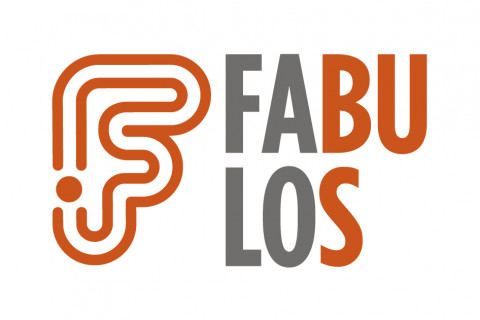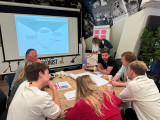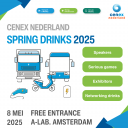FABULOS (Future Automated Bus Urban Level Operation System) is a European research and development project to establish and deliver a systemic proof-of-concept for automated last mile public transport as part of the existing transport system of urban areas, based on the use of self-driving minibuses. The FABULOS project has received funding from the European Union’s Horizon 2020 research and innovation programme and runs from 1 January 2018 until 31 December 2020. The FABULOS project has partners in Estonia, Finland, Greece, the Netherlands, Norway and Portugal. The six procuring partners use Pre-Commercial Procurement as a tool to co-create an innovative solution together with multiple companies. Contracts have been signed in December 2018 with 5 consortia. The first Phase (feasibility study) starts in January 2019. Actual piloting of fleets of robot buses takes place in all 6 partner cities from Spring 2002 onwards.
Most recent press release: https://fabulos.eu/five-consortia-awarded-contracts-in-fabulos-pre-commercial-procurement/
The FABULOS consortium has finalised the evaluation of the tenders in December 2018 and has awarded five consortia with contracts. The aim of these contracts is to facilitate procurement of R&D work to develop systems capable of operating fleets of automated minibuses. As a first step towards this goal, each consortium will conduct a feasibility study of proposed solutions and technologies.
After the closing of the FABULOS request for tenders on 31 October 2018, the tenders were assessed by the Technical Evaluation Committee. In addition to commercial feasibility and project management, nine functional criteria and three non-functional criteria were used. The functional criteria range from fleet management and remote operation and all the way to requirements for vehicle capabilities in mixed traffic. Societal and legal aspects form elements of the non-functional criteria. The fleet is expected to drive in mixed traffic, at urban speeds, in nearly in all weather conditions and without a conductor on board.
“We were positively surprised by the high quality of tenders received and were pleased to discover so many exceptional solutions to the FABULOS challenge. It will be very exciting to see these proposed solutions become a reality by the end of 2020,” summarises Technical Chair of the Evaluation Committee Oscar Nissin, from Metropolia University of Applied Sciences.
Five European consortia have succeeded in the first stage of the competition. In total, 16 companies from six European countries formed consortia as follows:
- The FVF Consortium consisting of three Finnish partners: Fortum Power and Heat Oy, Fleetonomy.ai Oy and VTT Technical Research Centre of Finland.
- The Kompai-Actia Consortium consisting of two French companies: Kompaï Robotics and Actia Automobile.
- The Mobile Civitatem Consortium consisting of four partners from Estonia: Modern Mobility Oü, Tallinn University of Technology, Silberauto Eesti AS and Ecofleet Eesti Oü. The fifth member of the consortium is the Danish company Autonomous Mobility A/S.
- The Saga Consortium consisting of four Norwegian partners: Halogen AS, Forus PRT AS, Spare Labs Inc. and Ramboll Management Consulting AS.
- The Sensible 4 – Shotl Consortium consisting of two partners: Sensible 4 from Finland and Shotl from Spain.
The total FABULOS procurement budget is around 5,500,000 euros (incl. VAT). The maximum budget for individual suppliers involved in all three phases is over 1,000,000 euros (incl. VAT).
What is the goal of the project?
Self-driving minibuses have already been tested in various countries, but a proof-of-concept for the management of autonomous fleets as part of the public transportation provision is not yet available. Furthermore, some parts of the driving automation need to reach a more mature stage in their development in order to be employable in normal urban settings, such as open roads. In other words, a demonstration of the economic, technical, societal and legal maturity of the solution needs to be carried out in a real-life setting.
The six partner cities are embracing this challenge by collectively procuring R&D for the prototyping and testing of smart systems that are capable of operating a fleet of self-driving minibuses in urban environments. These solutions are expected to be all-inclusive, encompassing software, hardware, fleet and services. Only after the successful integration of these solutions, cities are able to provide considerably better and more sustainable transport solutions for their residents.
What is the result of the project?
In Spring 2018, an Open Market Consultation took place, to determine the optimal scope of the Request for Tenders. The Tender was open in September and October 2018 and evaluation of the offers took place in November. Contracts have been signed in December 2018 with 5 consortia. These consist of 16 companies of 6 different EU countries. The first Phase (feasibility study) starts in January 2019. After this, the most promising concepts will be developed into well-defined prototypes and lab-tested in phase two. The third phase aims to verify and compare the first end products in real-life situations. An objective of the FABULOS project is to have the final selected prototypes tested as small fleets of automated buses in Estonia, Finland, Greece, the Netherlands, Norway and Portugal. This will takes place from March 2020 onwards.
Who initiated the project and which organizations are involved?
The FABULOS project was initiated by Forum Virium Helsinki. It has received funding from the European Union’s Horizon 2020 research and innovation programme and runs from 1 January 2018 until 31 December 2020. The FABULOS project has partners in Estonia (Ministry of Communications and Economic Affairs), Finland (Forum Virium Helsinki and Metropolia University of Applied Science), Greece (City of Lamia), the Netherlands (City of Helmond), Norway (city of Gjesdal) and Portugal (STCP public transport operator Porto).
What is the next step?
On 1 January 2019, the first phase of the FABULOS pre-commercial procurement – a feasibility study of the proposed solutions and technologies – is due to start. The aim is to verify the technical, economical and organisational feasibility of each consortium’s offer. The expected output is a report describing the results of the feasibility study and the conclusions for the start of the prototype development.
The most promising concepts will be developed into well-defined prototypes and lab-tested during the autumn of 2019 in the second phase of the pre-commercial procurement. The third phase aims to verify and compare the first end-products in real-life conditions. It is expected that three selected prototypes will be tested as small fleets of automated buses in Estonia, Finland, Greece, the Netherlands, Norway and Portugal from March 2020 onwards.
What can other cities learn from your project?
Pre-Commercial Procurement can be an excellent tool to co-create innovation in cities. It allows cities to work with companies to come to tailor-made solutions for their urban (mobility) challenges.
Most efficiency can be reached by having a small and dedicated consortium of procuring partners that has an experienced coordinator who has a central role and who is in charge of the large majority of the work packages.
Technically, robot buses and their (fleet) management still need significant R&D to be a commercially feasible solution for last mile transport or transport in rural areas.
Final results of FABULOS are expected by end 2020.






Hi Maine,
Currently the field testing in Helsinki (Sensible4 consortium with GACHA shuttle) is finished and the pilots in Tallinn (Estonia) and Gjesdal (Norway) are ongoing for another 3 weeks. In Tallinn, 3 Iseauto shuttles from AuVe Tech are driving a route next to the airport. In Gjesdal, 2 Navya shuttles (Saga consortium) have a route in a more residential area.
For the second round of pilots - Corona situation permitting - we will have Sensible4 in Gjesdal Nov-Jan, Iseauto shuttles in Lamia (Greece) Oct-Dec and Navya shuttles in Helmond (NL) Nov-Jan. We're carrying out user satisfaction surveys in all pilot sites.
We're not sharing technical evaluation results yet at this point. From a process point of view, we still believe the Pre-Commercial Procurement process is very useful for both cities and companies to accelerate innovation.
More info and updates in the newsletter: https://fabulos.eu/subscribe-to-newsletter/
The next one appears next week!
Video of the Helsinki pilot: https://www.youtube.com/watch?v=XhoMV3ygiKQ
Videos of Gjesdal and Tallinn come in a few weeks.
NB. As PCP is a closed 3-phase process, no new/additional companies or consortia can be added to the project anymore.
Hi @renskemartijnse-hartikka - can you answer Maine Rober's question? Could you share about the progress of the project? Thank you!
what's the progress https://www.yearbookavenue.online/